13th century
| Millennium: | 2nd millennium |
|---|---|
| Centuries: | |
| Timelines: | |
| State leaders: | |
| Decades: | |
| Categories: | Births – Deaths Establishments – Disestablishments |
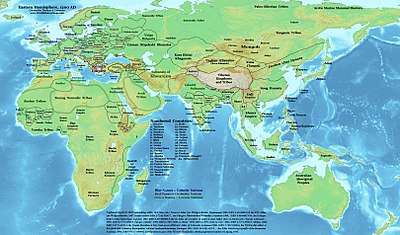
Map of Eurasia circa 1200 A.D.
As a means of recording the passage of time, the 13th century was the century which lasted from January 1, 1201 through December 31, 1300 in accordance with the Julian calendar in the Common Era. In the history of European culture, this period is considered part of the High Middle Ages, and after its conquests in Asia the Mongol Empire stretched from Eastern Asia to Eastern Europe.
Events
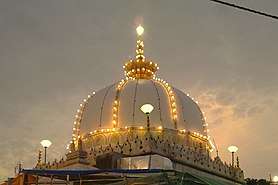
Tomb of the great Islamic scholar Mawlana Kwaja Moinuddin Chishti.
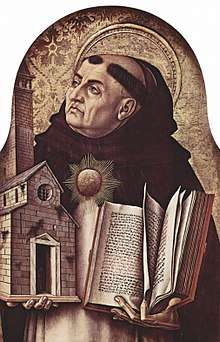
Thomas Aquinas, recognized as the most influential Western medieval legal scholar and theologist.
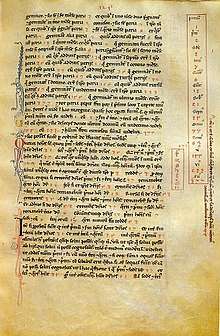
A page of the Italian Fibonacci's Liber Abaci from the Biblioteca Nazionale di Firenze showing the Fibonacci sequence with the position in the sequence labeled in Roman numerals and the value in Arabic-Hindu numerals.
1200s
- 1202 – Introduction of Liber Abaci by Fibonacci.
- 1202 – Battle of Basian occurred on July 27, between Kingdom of Georgia and Seljuks.
- 1204 – Fourth Crusade of 1202–1204 captures Zara for Venice and sacks Byzantine Constantinople, creating the Latin Empire.
- 1204 – Fall of Normandy from Angevin hands to the French King, Philip Augustus, end of Norman domination of France.
- 1205 – The Battle of Adrianople occurred on April 14 between Bulgarians under Tsar Kaloyan of Bulgaria, and Crusaders under Baldwin I, (July 1172–1205), the first emperor of the Latin Empire of Constantinople.
- 1206 – Genghis Khan is declared Great Khan of the Mongols.
- ? – The Marinids settled Zughba Arab from the Chelif Valley to Tamesna or they cohabit with the Zenata Berber
1210s
- 1212 – The Battle of Las Navas de Tolosa in Iberia marks the beginning of a rapid Christian reconquest of the southern half of the Iberian peninsula, mainly from 1230–1248, with the defeat of Moorish forces.
- 1213 – France defeats the Spanish Kingdom of Aragon at the Battle of Muret.
- 1214 – France defeats English and Imperial German forces at the Battle of Bouvines.
- 1215 – King John signs Magna Carta at Runnymede.
- 1217–1221 – Fifth Crusade captures Egyptian Ayyubid port city of Damietta; ultimately the Crusaders withdraw.
1220s
- 1221 – Venice signs a trade treaty with the Mongol Empire.
- 1222 – Andrew II of Hungary signs the Golden Bull which affirms the privileges of Hungarian nobility.
- 1223 – The Signoria, of the Republic of Venice is formed and consists of the Doge, the Minor Council, and the three leaders of the Quarantia.
- 1223 – The Mongol Empire defeats various Russian principalities at the Battle of the Kalka River.
- 1223 – Volga Bulgaria defeats the army of The Mongol Empire at the Battle of Samara Bend
- 1227 – Estonians are finally subjugated to German crusader rule during the Livonian Crusade.
- 1228–1229 – Sixth Crusade under the excommunicated Frederick II Hohenstaufen, who returns Jerusalem to the Crusader States.
- 1228–1230 – First clash between Gregory IX and Frederick II.
- 1226–1250 – Dispute between the so-called second Lombard League and Frederick II.
1230s
- 1232 – The Mongols besiege Kaifeng, the capital of the Jin dynasty, capturing it in the following year.
- 1233 – Battle of Ganter, Ken Arok defeated Kertajaya, the last king of Kediri, thus established Singhasari kingdom[1] Ken Arok ended the reign of Isyana Dynasty and started his own Rajasa dynasty.
- 1235 – The Mandinka tribes unite to form the Mali Empire which leads to the downfall of Takrur in the 1280s.
- 1239–1250 – Third conflict between Holy Roman Empire and Papacy.
- 1237–1240 – Mongol Empire conquers Kievan Rus.
- 1238 – Sukhothai was the first capital of Sukhothai Kingdom.
1240s
- 1241 – Mongol Empire defeats Hungary at the Battle of Mohi and defeats Poland at the Battle of Legnica. Hungary and Poland ravaged.
- 1242 – Russians defeat the Teutonic Knights at the Battle of Lake Peipus.
- 1243–1250 – Second Holy Roman Empire–Papacy War.
- 1244 – Ayyubids and Khwarezmians defeat the Crusaders and their Arab allies at the Battle of La Forbie.
- 1249 – End of the Portuguese Reconquista against the Moors, when King Afonso III of Portugal reconquers the Algarve.
- 1248–1254 – Seventh Crusade captures Egyptian Ayyubid port city of Damietta, Crusaders ultimately withdraw. Mamelukes overthrow Ayyubid Dynasty.
1250s
1260s
- 1260 – Toluid Civil War begins between Kublai Khan and Ariq Böke for the title of Great Khan.
- 1261 – Byzantines under Michael VIII retake Constantinople from the Crusaders and Venice.
- 1262 – Iceland was brought under Norwegian rule, with the Old Covenant.
- 1265 – Dominican friar and theologian, Thomas Aquinas begins to write his Summa Theologiae.
- 1268 – Fall of the Crusader State of Antioch to the Mamelukes.
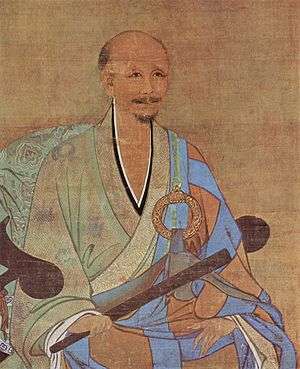
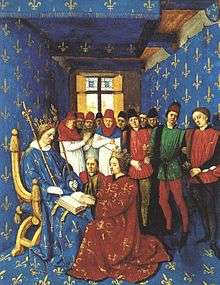
Hommage of Edward I (kneeling), to the Philippe le Bel (seated). As Duke of Aquitaine, Edward was a vassal to the French king.
1270s
- 1271 – Edward I of England and Charles of Anjou arrive in Acre, starting the Ninth Crusade against Baibars.
- 1272–1274 – Second Council of Lyon attempts to unite the Churches of the Eastern Roman Empire with the Church of Rome.
- 1274 – The Tepanec give the Mexica permission to settle at an islet which was named Cauhmixtitlan (Eagle's Place Between the Clouds)
- 1275 – Sant Dnyaneshwar who wrote Dnyaneshwari (a commentary on the Bhagavad Gita) and Amrutanubhav was born.
- 1275 – King Kertanegara of Singhasari launched Pamalayu expedition against Melayu Kingdom in Sumatra (ended in 1292).
- 1277 – passage of the last and most important of the Paris Condemnations by Bishop Tempier, which banned a number of Aristotelian propositions
- 1279 – The Song dynasty ends after losing the Battle of Yamen to the Mongols.
1280s
- 1282 – Aragon acquires Sicily, after the Sicilian Vespers.
- 1284 – Peterhouse, Cambridge founded by Hugo de Balsham, the Bishop of Ely.
- 1284 – King Kertanegara launched Pabali expedition to Bali, which integrated Bali into the Singhasari territory.
- 1285 – Second Mongol raid against Hungary, led by Nogai Khan.
- 1289 – The County of Tripoli falls to the Bahri Mamluks led by Qalawun.
- 1289 – Kertanegara insulted the envoy of Kublai Khan, who demanded Java to pay tribute to Yuan Dynasty.[2][3]
1290s
- 1291 – The Swiss Confederation of Uri, Schwyz, and Unterwalden forms.
- 1291 – Mamluk Sultan of Egypt al-Ashraf Khalil captures Acre, thus ending the Crusader Kingdom of Jerusalem (the final Christian state remaining from the Crusades).
- 1292 – Jayakatwang, duke of Kediri, rebelled and killed Kertanegara, ended the Singhasari kingdom.
- 1292 – Marco Polo, on his voyage from China to Persia visited Sumatra and reported that on the northern part of Sumatra there were six trading ports including Ferlec, Samudera and Lambri.[4]
- 1293 – Mongol invasion of Java,[5] Kublai Khan of Yuan dynasty China, sent punitive attack against Kertanegara of Singhasari. The Mongol forces were repelled.
- 1293 – In 10 November the coronation of Nararya Sangramawijaya as the monarch of Majapahit kingdom, marked the foundation of Hindu Majapahit kingdom in eastern Java.
- 1297 – Membership in the Mazor Consegio or the Great Council of Venice of the Venetian Republic is sealed and limited in the future to only those families whose names have been inscribed therein.
- 1299 – Ottoman Empire is established under Osman I
- 1300 – Islam is thought to have become established in the Aceh region.
- 1300 – Aji Batara Agung Dewa Sakti founded Kingdom of Kutai Kartanegara|Sultanate of Kutai in the Tepian Batu or Kutai Lama.
Significant people
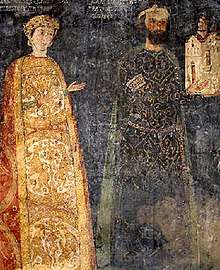
Frescoes from the 13th century Boyana Church
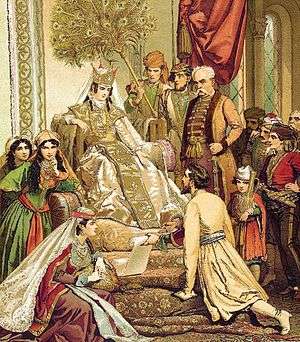
Queen Tamar
- Abu Bakr, relative of Sundiata Keita who reclaimed the throne from his nephew and restored order to Mali
- Albertus Magnus, German philosopher and theologian
- Alexander of Hales, Franciscan friar and theologian
- Alexander Nevsky, Grand Prince of Novgorod and Vladimir
- Alexios III Angelos, Byzantine Emperor
- Andrea of Grosseto, Italian writer
- Anthony of Padua, Portuguese Franciscan friar, bishop
- Baibars, Mameluk sultan of Egypt
- Batu Khan, Mongol ruler and the founder of the Golden Horde
- Béla IV of Hungary rebuilder of Hungary after the devastating Mongol invasion
- Birger Jarl, Swedish statesman, earl, and founder of Stockholm
- Bonaventure, Franciscan theologian, bishop, and cardinal
- Kwaja Moinuddin Chishti, scholar, poet and descendant of the Islamic Prophet Muhammad
- Cimabue, Florentine painter
- Dante Alighieri, Florentine writer and poet
- Dōgen, priest, writer, poet, philosopher, and founder of the Sōtō school of Zen
- Dominic Guzman, Spanish Catholic friar and founder of the Order of Preachers
- Edward I of England, English King
- Elisabeth of Hungary, Hungarian princess of the Kingdom of Hungary
- Enrico Dandolo, Doge of the Republic of Venice
- Fibonacci, the most talented Western mathematician of the Middle Ages
- Francis of Assisi, Umbrian founder of the Franciscan order
- Frederick II, emperor of the Holy Roman Empire
- Genghis Khan, founder of Mongol Empire
- Gertrude the Great, German Catholic nun and spiritual writer
- Giotto di Bondone, Italian painter
- Gregory X, Pope
- Haakon Haakonsson, king of Norway from 1217 to 1263. After the long civil war Norway would again prosper under his rule and come to dominate Scandinavian politics.
- Henry III of England, king
- Ibn Taymiyyah, famous Hanbali, Salafi Scholar of Islam
- Innocent III, Pope
- Ivan Asen II, Emperor of Bulgaria
- Kaloyan, Emperor of Bulgaria
- Ken Arok (or Ken Angrok), Rajasa (died c. 1227), was the founder and first ruler of the Singhasari (also Singasari) Kingdom.
- Kublai Khan, Khan ruler, founder of Yuan Dynasty in China
- Jalal Uddin Muhammad Rumi, scholar and famous poet
- Lasha Giorgi, King Giorgi IV of Georgia
- Lembitu, Estonian ruler
- Louis IX of France, St. Louis, French king and crusader
- Nachmanides, leading medieval Jewish scholar, Sephardic rabbi, philosopher, physician, kabbalist, and biblical commentator.
- Madhvacharya, Indian philosopher who was the chief proponent of the Dvaita school of Vaishnavism and Tattvavada "the philosophy of reality"
- Manco Cápac First Governor and founder of the Inca civilization in Cusco
- Marco Polo, Venetian trader and explorer
- Mevlana, philosopher and poet
- Petrus Peregrinus, scientist
- Oduduwa, First King of the Yorubaland
- Osman I, Sultan, founder of Ottoman Empire
- Ottokar II of Bohemia, King of Bohemia
- Ramon Llull, Majorcan philosopher
- Robert Grosseteste, English statesman, theologian, and scientist
- Roger Bacon, Franciscan friar, philosopher, and scientist
- Rusudan, Queen Regnant of Georgia
- Sundiata Keita founder of the Manden Kurufaba (Mali Empire)
- Mansa Sakura, deposed Abubakari I of the Malian throne to then lead an expansionist campaign
- Saadi Persian poet
- Sinchi Roca Second Sapa Inca of the Kingdom of Cusco
- Snorri Sturluson, historian and saga-writer
- Sri Indraditya, credited as founder of first historical Siamese dynasty
- Tamara, ruler of Georgia
- Thomas Aquinas, Neapolitan Catholic friar and theologian
- William Marshal, knight and statesman.
- William Wallace, Scottish national leader
- Yunus Emre, Turkish poet and Sufi mystic
Inventions, discoveries, introductions
- List of 13th century inventions
- Early 13th century – Xia Gui paints Twelve Views from a Thatched Hut. Southern Song dynasty. It is now kept at The Nelson-Atkins Museum of Art, Kansas City, Missouri.
- The motet form originates out of the Ars antiqua tradition of Western European music.
- Manuscript culture develops out of this time period in cities in Europe, which denotes a shift from monasteries to cities for books.
- Pecia system of copying books develops in Italian university-towns and was taken up by the University of Paris in the middle of the century.
- Wooden movable type printing invented by the Chinese governmental minister Wang Zhen in 1298.
- The earliest known rockets, landmines, and handguns are made by the Chinese for use in warfare.
- The Chinese adopt the windmill from the Islamic world.
- Guan ware vase is made. Southern Song dynasty. It is now kept at Percival David Foundation of Chinese Art, London.
- 1280s – Eyeglasses are invented in Venice, Italy.
- Late 13th century – "Night Attack on the Sanjo Palace" is made. Kamakura period. It is now kept at Museum of Fine Arts, Boston.
- Late 13th century – Descent of the Amida Trinity, raigo triptych, is made. Kamakura period. It is now kept at The Art Institute of Chicago.
See also
References
- ↑ "Ken Angrok". Encyclopædia Britannica. Retrieved 25 July 2010.
- ↑ Grousset, Rene (1988), Empire of steppes, Wars in Japan, Indochina and Java, New Jersey: Rutgers University Press, p. 288, ISBN 0-8135-1304-9 .
- ↑ page 243
- ↑ History of Aceh Archived August 13, 2012, at the Wayback Machine.
- ↑ Weatherford, Jack (2004). Genghis khan and the making of the modern world. New York: Random House. p. 239. ISBN 0-609-80964-4.
External links
- James J. Walsh (1907). "The Thirteenth: Greatest of Centuries". www.nd.edu. Archived from the original on 2017-03-01.
This article is issued from
Wikipedia.
The text is licensed under Creative Commons - Attribution - Sharealike.
Additional terms may apply for the media files.